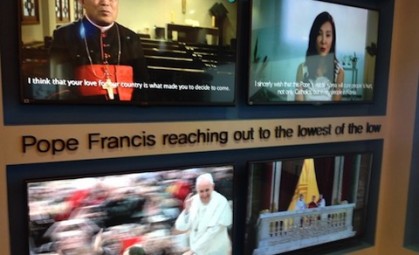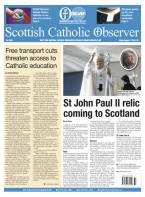BY Daniel Harkins | August 14 | ![]() 0 COMMENTS
0 COMMENTS ![]() print
print

Pope brings message of peace and reconciliation to South Korea
Pope Francis began first trip to Asia with a call for ‘quiet listening and dialogue’ in Korea rather than recriminations but North Korea fires warning shots
Pope Francis arrived in South Korea today bringing a message of peace and reconciliation on his first visit to Asia.
The Holy Father will spend five days in the county where he will take part in Asian Youth Day celebrations and will beatify 124 Koreans who died during persecution in the late 18th and 19th centuries.
Upon his arrival in the country, the Pope met President Park Geun-hye and spoke about young Koreans and the role they can play in peace.
“It is especially important for us to reflect on the need to give our young people the gift of peace,” the Pope said, adding that ‘peace can be won through quiet listening and dialogue, rather than by mutual recriminations, fruitless criticisms, and displays of force.’
South Korea is still technically at war with its northern neighbour with a demilitarised zone splitting the two countries. The 1950-1953 Korean War killed hundreds of thousands of civilians on both sides of the conflict. North Korea is reported to have fired three short-range rockets into the Sea of Japan just before the Pope arrived in Seoul.
As he flew to Korea, the Pope told accompanying reporters that his trip was ‘not a tourist visit,’ and prayed for an Italian journalist and his Palestinian translator who were killed on Wednesday in Gaza.
Pope Francis is the first pontiff to visit South Korea since 1989. In contrast with St John Paul II’s then visit, Pope Francis’ was granted permission to fly over Chinese airspace, and in keeping with custom, the Holy Father sent a message to President Xi conveying his best wishes and invoking ‘divine blessings of peace and well-being upon the nation.’
The Pope will tomorrow celebrate Mass in Daejeon World Cup Stadium with young Catholics and on Saturday will beatify those killed during Catholic persecution in Korea in which 10,000 people are believed to have been killed.
“Korean culture understands well the inherent dignity and wisdom of our elders and honours their place in society,” the Pope said. “We Catholics honour our elders who were martyred for the faith because they were willing to give their lives for the truth which they had come to believe and by which they sought to live their lives. They teach us how to live fully for God and for the good of one another.”
On Sunday, the Pope will close Asian Youth Day, and he will end his trip on Monday with a Mass for Peace and Reconciliation at Seoul’s Myeong-dong Cathedral.











